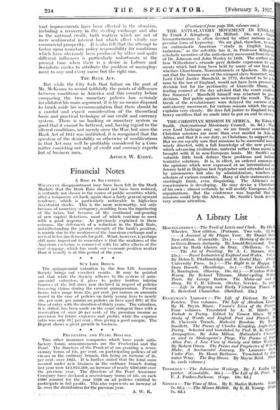(Continued from page 210, column one.) THE ANTI-SLAVERY MOVEMENT IN
ENGLA, By Frank J. Kfingberg. (H. Milford. 18s. net.)—Efig humanitarianism is often decried by other nations as peculiar form of hypocrisy. We are glad, therefore, to no • an enthusiastic American "study in English hum tarianism," as the sub-title has it, in Professor Klingbe scholarly narrative of the anti-slavery movement from the di of Dr. Johnson and John Wesley to 1838. The author s how Wilberforce's crusade gave definite expression to se ments which had long been held by many of our best whether Churchmen, Nonconformists or Quakers. He po' out that the famous case of the escaped slave Somerset, n Lord Chief Justice Mansfield, in 1772, declared to be a man by the law of England, would not have been pressed to decision but for the pertinacity of Granville Sharp, leading counsel of the day advised that the court could ni free Somerset ; Mansfield himself was reluctant to give decision. But public opinion welcomed the result. The break of the revolutionary wars delayed the success of t}/ anti-slavery movement, for various reasons which the autta explains very clearly. He does full justice to England for t,./ heavy sacrifices that we made later to put an end to slavery,


























































 Previous page
Previous page